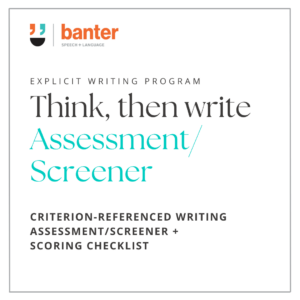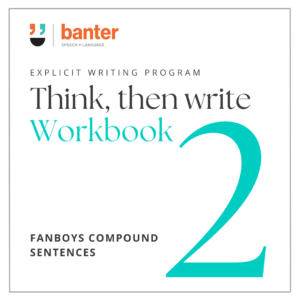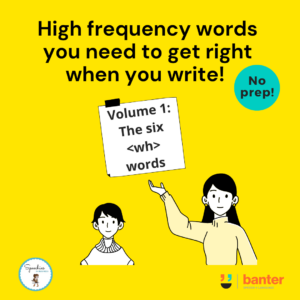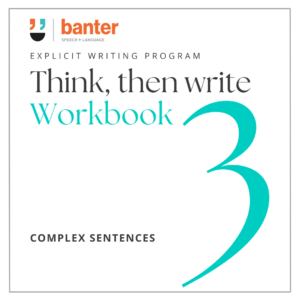Showing 381–385 of 533 results
-

$65.00 including GST
Many writing programs start at the discourse (or text type) level, with tasks like recounts, procedures, and stories. For many students, however, this is too advanced and sets them up for failure. Texts are made up of paragraphs, and paragraphs are made up of sentences. Let’s start with sentences and work our way up!
In this 340+ page workbook, you will learn how to write simple sentences, using a range of high-frequency sentence structures. Introductory writing exercises include subject-verb (SV), subject-verb-object (SVO), subject-verb-complement (SVC), subject-verb-adverb (SVA), and subject-verb-object-adverbial (SVOA) phrase sentences.
-

$40.00 including GST
Within any class, writing skills vary widely – even into high school. To tailor writing support to each student, and to figure out quickly where a student is at with their writing skills, we’ve developed this short criterion-referenced assessment tool.
Starting with simple, compound, and complex sentences, we then screen writing skills with short answer questions using high-frequency academic verbs (e.g. describe, outline and explain). Next we step-up to questions requiring paragraph-length answers and verbal reasoning. Finally, we look at students’ narrative writing skills.
This no-prep 35-page screener is designed to elicit several writing samples. In addition to screening sentence, paragraph and short text composition skills, the multiple samples elicited enable you to comment on overall cohesion, patterns of spelling and punctuation errors, as well as handwriting. We’ve chosen topics that don’t require specific technical knowledge to control for background knowledge and are relatively age-neutral.
We’ve also included a 13-page Scoring Checklist (Google Form) so you may score your students’ results.
-

$95.00 including GST
In this 500+ page workbook, we teach students of all ages to write compound sentences featuring the FANBOYS coordinating conjunctions. The acronym FANBOYS (‘for’, ‘and’, ‘nor’, ‘but’, ‘or’, ‘yet’, & ‘so’) – is a useful way to learn and remember coordinating conjunctions.
In our workbook, we define compound sentences and explain the different functions of each coordinating conjunction. We then provide lots of scaffolded sentence models, sentence-combination practice, and independent practice to help students acquire and automate the skill.
-

$10.00 including GST
In this no-prep 47-page resource, we include modules to help students to use the Six <wh> words (who, what, when, where, why, and which) in context by providing the following exercises:
-
- Dictation practice using the Six <wh> words in questions.
- Dictation practice using the Six <wh> words in sentences to join ideas together.
- Writing <wh> questions using picture cues.
- Writing <wh> questions to plan school reports and assignments about common topics.
- Practising getting commonly confused words right, e.g. where/wear, what/watt, which/witch.
- Writing <wh> questions when provided with answers, similar to Jeopardy.
- Writing a story with the Six <wh> words.
-

$95.00 including GST
This 650+ page workbook includes scaffolded writing practice to help students of all ages generate a variety of complex sentences using subordinating conjunctions, including:
-
- “because” – for cause and effect relationships;
- “although” – for contrastive relationships;
- “if”, “unless” and “until” – for conditional relationships; and
- “while”, “before” and “after” – for relationships between events connected by time.
For each conjunction, sentence fragment exercises have been included to kick-start complex sentence writing. To support people with additional language and learning needs, the modules feature topics that require a minimal amount of background knowledge, and include examples and scaffolds to help model and support students of all abilities.






 (R414) The Zoo Druid
(R414) The Zoo Druid